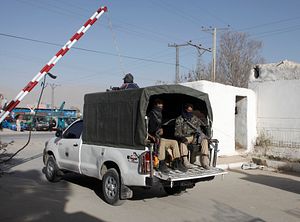The Islamic State (ISIS) has claimed responsibility for Monday night’s attack on a police training center in Quetta, which was reportedly carried out by Lashkar-e-Jhangvi militants. At least 60 cadets were killed and more than 120 injured when militants stormed inside the Police Training College in the capital of Pakistan’s volatile Balochistan province. A few months earlier, on August 8, 88 people were killed when the city’s Civil Hospital was bombed in an attack designed to target the local lawyers’ community.
The Police Training College attack comes a week before Pakistan Tehreek-e-Insaf (PTI) chief Imran Khan’s announced lockdown of the capital. Khan will lead the protest to demand Prime Minister Nawaz Sharif’s resignation over revelations in the Panama Papers. PTI’s planned siege of Islamabad, scheduled for November 2, has been supported by Lal Masjid, a mosque in the capital which is run by the ISIS-sympathizing cleric Abdul Aziz. Local Urdu publications have further reported that PTI’s march toward Islamabad might receive the backing of Sami-ul-Haq’s seminary Dar-ul-Uloom Haqqania. Sami-ul-Haq is known as the “Father of the Taliban,” with his seminary receiving a PKR 300 million ($2.9 million) grant from the PTI-led Khyber Pakhtunkhwa government’s budget this year.
To counter’s PTI’s efforts to woo the Islamists, Federal Interior Minister Chaudhary Nisar Ali Khan on October 22 met with the Difa-e-Pakistan Council (DPC), an umbrella coalition of over 40 Islamist groups and parties, spearheaded by Sami-ul-Haq and Ahmed Ludhianvi of the banned Ahl-e-Sunnat Wal Jamaat (ASWJ). ASWJ, the political wing of the Sipah-e-Sahaba, is an anti-Shia outfit whose militant offshoots include, among others, the Lashkar-e-Jhangvi (LeJ). According to Balochistan’s IG Frontier Corps (FC), Major General Sher Afgan communication intercepts showed the Police Training College attack was carried out by LeJ’s Al-Alimi faction.
Despite the Islamic States’ limited functional presence in the region, the Quetta attack is the latest example of the Middle Eastern jihadist group overlapping with militant organizations originating in Punjab, the center stage for the political struggle in Pakistan. The PTI is trying to wrestle control over the country’s most populous province, pivotal to forming the government in the center.
The ruling Pakistan Muslim League (Nawaz) (PML-N) hobnobbing with jihadist leaders is in stark contrast to where the government stood earlier this year. In a run of reformist actions following victories in local bodies’ elections and high-profile by-elections last year, the PML-N declared official holidays for festivals of religious minorities, ordered the removal of anti-Ahmadiyya hate literature from Punjab’s biggest IT market, passed a progressive Women Protection Bill, and hanged Mumtaz Qadri for the murder of former Punjab governor Salmaan Taseer.
The government’s wherewithal to translate its clear electoral strength into progressive policymaking was first dented by April’s Panama Papers revelations and then the turmoil in India-administered Kashmir, which triggered India-Pakistan diplomatic conflict, in turn allowing Pakistan’s powerful military establishment to step in and further shackle the PML-N.
With Nawaz already under pressure from Imran Khan and Army Chief Raheel Sharif, whose extension beyond his scheduled retirement in November is a major bone of contention in the civil-military dynamics as things stand, the prime minister can ill-afford a third front to open up in the shape of religious groups. This has resulted in the PML-N going back to its pre-2013 stratagem of political alliances with Islamist outfits in Punjab with an understanding that these groups would ‘limit’ their militancy outside Punjab, which the PML-N governed between 2008 and 2013. Could a similar understanding be in store to help Sharif ward off Khan’s challenge this November?
Khan is aware that considering the results in Punjab since 2013, his party does not stand a chance against the PML-N in the 2018 elections. Despite efforts to dent the Pakistan Peoples Party (PPP)’s vote bank in rural Sindh, the PTI must win over Punjab, the biggest slice of the electoral pie, if Khan is to have any chance to lead Pakistan. Unless, of course, Khan can cause enough mayhem in the capital next month to force the hand of the Army, which is already looking for a reason to step in that is convincing enough to withstand global pressure.
The Asia Bibi case hearing being suspended by the Pakistan Supreme Court on October 15, following threats issued by the Lal Masjid, underscores the fact that the Islamists have regained their clout. The Islamist groups can further cash in on the military establishment’s focus on Kashmir jihad and Imran Khan’s obsession with becoming the prime minister to regain any ground lost to Operation Zarb-e-Azb and the National Action Plan.
Hence, with all parties eyeing control over the center needing the backing of religious groups, in one form or another, it is evident that Islamist support will go to the highest bidder. The higher the bid, the more frequent terror attacks outside of Punjab will become. And with ISIS adding to its presence in Punjab, the ground ceded to jihadism now might be obliterated before it can be recovered.

































